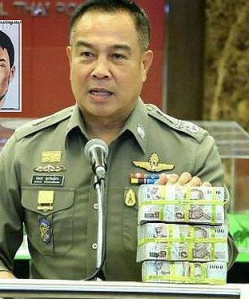Almost no one would flinch if told that senior cops in Thailand are at the top of a corruption vacuum cleaner that sucks huge amounts of money to the top. The stories of police corruption have been especially numerous over the past couple of years. This is probably because the junta disrupted the system by tipping out those they identified as pro-Thaksin Shinawatra officers and because the palace has a serial police meddler in place.
 Interestingly, The Nation has done a little research on the wealth of some recent top cops. The amounts of money they list are not at all surprising but their choice of cops to list is somewhat hit-and-miss,
Interestingly, The Nation has done a little research on the wealth of some recent top cops. The amounts of money they list are not at all surprising but their choice of cops to list is somewhat hit-and-miss,
They do mention the unabashedly corrupt former national police chief Pol Gen Somyos Pumpanmuang. PPT has had several posts over many years regarding his unexplained wealth.
It was back in 2014, following the appointment of scores of police and military to junta committees and other rubber stamp institutions, that a reader put together a list of unexplained wealth. That reader used official data.
Back then we observed:
The top money secretes to the top police. We acknowledge that there are a couple of low ranks listed, who probably report a rank having departed the cops early, but even so, the average for the top brass in the police is a whopping 258 million baht.
Nothing has probably changed, although we’d guess the top cops rake in more these days.









